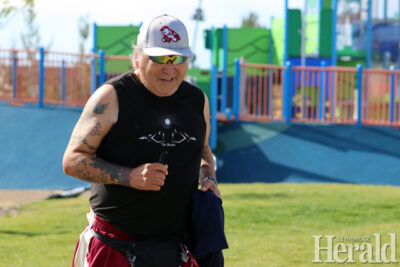Heart attack survivor runs for Terry Fox
By Al Beeber - Lethbridge Herald on September 17, 2024.
 Herald photo by Al Beeber
Above: Five-time heart attack survivor Terry Provost runs Sunday in his first Terry Fox Run at Legacy Park. The event attracted just over 100 participants.
Herald photo by Al Beeber
Above: Five-time heart attack survivor Terry Provost runs Sunday in his first Terry Fox Run at Legacy Park. The event attracted just over 100 participants.LETHBRIDGE HERALDabeeber@lethbridgeherald.com
At the age of 63, Coalhurst resident Terry Provost did his first Terry Fox Run on Sunday at Legacy Park.
Five-time heart attack survivor Provost was born the same year as Fox, whose Marathon of Hope ended near Thunder Bay, Ontario in 1980 when the cancer that had cost him a leg had returned.
That year, Fox who had a leg amputated due to osteogenic sarcoma, dipped that leg into the Atlantic Ocean on April 12, his Marathon of Hope ending in Northwestern Ontario on Sept. 1 after he had run 5,373 kilometres and the discovery of cancer in his lungs.
Provost, a native of Brocket wanted to honour the man whose mission to raise funds for cancer research sparked the launch of the annual Terry Fox Runs in 1981.
And on Sunday as his wife watched and a granddaughter watched, Provost did the run with another granddaughter.
Along with a large group of other supporters including Terry Fox’s uncle Terry, Provost did the route at Legacy in honour not only of Fox, but also his good friend Leander Strikes With a Gun who died of cancer last week.
“I’ve always wanted to run in it,” Provost said of the run.
“I had five heart attacks and I told myself I’m going to run, I’m going to run in the Terry Fox Run.
“I’ve had a lot of family members who have died from cancer so I thought I should run for them” as well as Strikes with a Gun whose funeral Provost attended on Saturday.
Around 1995, Provost weighed about 300 pounds and he decided he needed to do something.
“I was laying in a bed in Calgary waiting for my angiogram and I was staring at the mountains. I was 35 years old and I thought ‘am I ever going to make it up there?’ A year from that date my wife and I climbed Chief Mountain” and since then he has climbed other mountains, said Provost who suffered his five heart attacks within a 10-year span, his last being in 2005 which he said was his lowest point in life.
In the early 2000s with his health issues including bad knees, Provost said he couldn’t even walk around the block but he forced himself to get up and start walking.
“Every day I’d try walking” and last week he managed to walk six kilometres. Since 2005 he’s lost a lot of his weight and is feeling much better.
His goal was to make it to his daughter’s wedding in 2009 and walk her down the aisle which he succeeded in doing.
When his first granddaughter was born, Provost decided he need to live for her and that’s when he really started walking, he said, calling his two grandchildren his pride and joy.
“I’m here for my grandkids now” as well as his daughters and son, he said before the run began.
“I’ve been working with weights, walking and running and I feel the healthiest I’ve felt since my 20s.”
Before the run, Terry Fox’s uncle Terry of Lethbridge spoke briefly, telling the roughly 100 participants that his nephew was determined to find a cure for cancer.
He said he’s dealt with cancer for 23 years and he was at the run because of his nephew and the people running in honour of him.
“After 23 years, imagine, I’m still fighting it (cancer) and I’m still winning it,” Fox said to applause.
The run was staged with the work of only two volunteers, said emcee and race organizer Austin Moloughney who carried the Terry Fox Run banner with uncle Terry at the head of the run.
The run raised just over $9,000 for the Terry Fox Foundation. Over the decades the annual run has raised more than $850 million in Canada.
According to the foundation, nearly two in five Canadians will deal with cancer during their lifetimes.
“Terry never gave up and neither will we. Together, we’re forging a path to a future where cancer is no longer a threat,” says the foundation on its website.
The average survival rate for all cancers has increased from 25 per cent in the 1949s to over 60 per cent in 2024, says the foundation, with some having a 90 per cent survival rate.
Fox ran nearly 42 kilometres or 26 miles a day through all kinds of weather until he was forced to stop. His runs often began before 4:30 a.m. and didn’t end until early in the evening.
28-27


